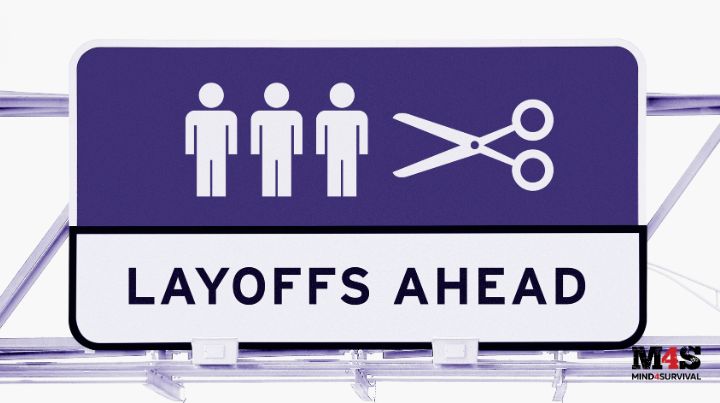Signs You Are About to Get Laid Off from Your Job and What to Do About It

A few months ago, I found out that jobs were being eliminated at my workplace. Like most people, I need my job to pay my bills and cover my health insurance. Naturally, I went into stress mode right away. So many other companies are quietly cutting back their workforce, so you need to be aware of the signs of a potential layoff.
Warning Signs
-
Less Work
One of the first signs I noticed was a reduction in projects being assigned to our team. Normally, I felt swamped with work, but suddenly, less work was being assigned. Sure, it was a relief that I was not bogged down with work, but after a while, I started to be concerned about it. If you find that projects are being reassigned or your daily tasks have been reduced, it could be a sign that your role is being phased out.
-
Reduced Communication
A significant decrease in communication from your manager or colleagues can be a red flag. Not being included in meetings, emails, or important conversations may indicate that decisions are being made without your input, possibly concerning your employment status.
-
Lower Earnings
Companies that are struggling tend to let people go. If your organization is experiencing budget cuts, reduced revenue, or a hiring freeze, it may be preparing to downsize its workforce. However, there are exceptions. Sometimes, companies just feel the need to conserve resources. My company is not in financial trouble but wants to save money, which brings me to the next warning sign below.
-
Outsourcing
About a year ago, the company announced that it was moving some positions overseas. That was a huge red flag. Of course, management assured us that everything was just peachy and that none of the outsourcing would affect us. Next thing you know, a whole department found itself without any work, so the company decided to send our jobs to them.

-
Mergers and Acquisitions
If your company has merged with another or acquired another similar company, there may be duplications in job functions. It could be a sign of layoffs. This is exactly what happened to my nephew. His company was bought by a larger one, and when they combined their workforces, they eliminated his position.
-
Hiring Freeze
Our team has had a hiring freeze for a while now. Management is not replacing anyone who left or went on leave. They are just dividing the work among the remaining staff. If your company implements a hiring freeze, cancels projects, or undertakes significant cost-cutting measures, consider that layoffs may be coming as a way to reduce expenses.
-
Lower Budget or Cost-cutting Measures
If you try to order supplies and get push-back or an outright denial, that’s a sign the company is cutting back.
-
Rumors
Don’t ignore rumors or insider information about potential layoffs. While not always reliable, such information can sometimes provide early warning signs.
What to Do:
Things to Do at Work
-
- Find Out if Anything Has Changed: It might be a good idea to tactfully ask your manager what’s going on. In my case, I tried to bring up the fact that I was getting less work compared to the previous year, but my superiors told me that nothing was going on; it was just a cyclical thing. On the other hand, you may get lucky and find out info ahead of time.
- Show Initiative: Volunteering for new projects and demonstrating your willingness to take on additional tasks is always a good idea.
- Document Achievements: Keep a record of your accomplishments to showcase your value during performance reviews or future job searches.
- Stay in Touch: Make an effort to remain involved by talking to colleagues, proactively seeking updates, and participating in discussions. Strengthen relationships with colleagues and build a professional network that can support you if needed.
- Monitor Financial Reports: Stay informed about your company’s financial health through public financial statements and internal communications.
- Position Description: Now is a good time to obtain a copy of your position description. Employees often don’t realize how much they do in their day-to-day activities. Get a copy now before it’s too late.

-
- Update Your Resume: Keep your resume current and start gathering references.
- Start Applying In-house: Look for other positions within the company and see if you can apply for a new job that is different from those that they are outsourcing. You may still get laid off later, but hopefully, the hiring department is in better shape than your current one and may buy you some time.
- Stay Professional: Avoid contributing to gossip and maintain a professional demeanor.
- Research HR Policies: While you’re still employed, read your Employee Handbook and find out what type of severance pay the company normally offers.
Things To Do at Home
-
-
- Save Money: Increase your savings to cushion the impact of a potential job loss.
- Cut your Expenses: As soon as I heard layoffs were happening, I started looking at my current budget and expenses. Look for ways to reduce costs and adjust your budget in anticipation of potential job loss.
- Start Job Searching: Begin looking for new job opportunities discreetly in order to have a plan in place. Tip: If you are actively job searching and updating your LinkedIn or other job search sites, be prepared for the possibility that your boss or colleagues will find out you’re looking if they are checking as well.
- Use Your Health Insurance Benefits: Schedule doctor and dentist appointments and fill prescriptions for eyeglasses and medicines.
- Don’t Make Any Major Purchases: Hold off on buying big-ticket items.
- Pay Off Debt: Avoid getting into new debt, and pay off debt as much as possible.
- Start Prepping: Boost your preparedness level by stocking up on food and everyday supplies. Your stockpile will see you through a period of unemployment.
-
What to Do If You Are Laid Off
If you receive the news that your employer is laying you off, it’s essential to stay calm and take the following steps to protect your finances and career:
Your Severance Package
Since you already looked it up before this happened, you have an idea of what is offered, but you need to ensure you understand everything covered.
Carefully review the severance package offered by your employer. Ensure you understand all the details, including any benefits, compensation, and non-compete clauses. See if any aspects are negotiable.
Calculate the worst-case scenario and count how long the package would last if you have no savings or additional income.
Apply for Unemployment Benefits
File for unemployment benefits as soon as possible to provide a financial cushion while you search for new employment.
Cut Back on Expenses
- Look at everything you spend and cut back on any nonessentials.
- Review your bills and try to negotiate with your utilities and creditors for a lower rate.
- Save as much money as you can.
Start a Microbusiness
A micro business might help you get some money to come in while you’re in between jobs. Consider your hobbies-can you sell your creations to make some money? Do you like animals? Pet-sitting might be a good option. Or even running errands for someone who is home-bound.
Practice Self-sufficiency Skills
- Acquire self-sufficiency skills now; skills that allow you to repair things yourself will save you money even if you don’t lose your job.
- While the holidays are months away, start thinking about making homemade gifts.
Update Your Resume and Online Profiles
Immediately update your resume, LinkedIn profile, and other professional online profiles. Highlight recent accomplishments and roles to attract potential employers.
Network and Seek Support
Reach out to your professional network for support and potential job leads. Attend industry events, join professional groups, and use social media to expand your connections.
Consider Temporary or Freelance Work
Explore temporary or freelance work opportunities to maintain an income stream and keep your skills sharp while searching for a full-time position.
Develop Skills
Use the time between jobs to enhance your skills or learn new ones. Online courses, certifications, and workshops can improve your chances of getting hired and open up new career opportunities.
Conclusion
Being aware of the signs of an impending layoff can help you take steps to protect your career and finances. Even if nothing happens, it’s a good idea to be prepared. Don’t panic: stay informed, start cutting back on expenses, and be prepared to adapt.
Additional Resources:
- 7 Best Tips on How to Prepare for Hyperinflation
- 10 Best Thrift Store Finds for Living a Self-Reliant Life (2023)
- Freeze Dried Holiday Gifts for Everyone on Your List!
- Financial Preparedness Mindset
Related Articles
FREE Guide
Read the Best Seller
Join Mind4Survival
Stay informed by joining the Mind4Survival! 100% Secure! 0% Spam!
Affiliate Disclosure...
Mind4Survival is a free, reader-supported information resource. If you make a purchase through our link, we may, at no cost to you, receive an affiliate commission.
Do You Want To Be Ready No Matter What?

Download our free 39-page guide with interactive, 7-Day Emergency Kit Checklist and take the first step toward real preparedness.
- Know exactly where to start.
- Save time and money.
- How-to build a complete Basic Emergency Kit.
- Level up your safety and security.
Join Mind4Survival
Stay informed by joining the Mind4Survival! 100% Secure! 0% Spam!





